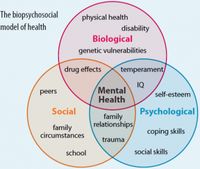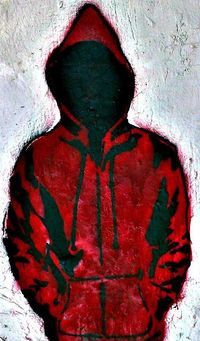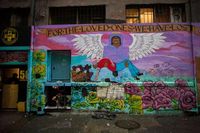There are many feelings a person may feel during homelessness. From abandonment, resentment, hate, rage, spite, and gratitude, there is a whole range of emotions to survive another day; "It's a difficult life, but we survive. Every day we survive." says Frenchie in Toronto where every night about 8,000 people sleep in shelter, and this number continues to increase. The precariousness of having to figure out where to sleep night after night, or, in the case of winter, survival, is a daily battle.
What do you do when you're kicked out at seventeen for the third time? I don’t feel like a youth when I’m alone. There are so many questions I ask myself and stories I ponder about the situation that so many of us are in. What can the future look like for a gifted child with a desire to help who can excel in academia, show compassion, and live for something other than himself? What happens after years of being told you would someday make it further than most others, only to become abandoned to an early grave, as you find yourself barely seventeen, entrenched in a world of clandestine activity, duplicity, exploitation, poverty, and - by extension - crime and violence? And finally, when you survive all of the above, you will find that these experiences will haunt you for the rest of your life.
Most people don't know what one day of experiencing homelessness feels like, let alone a life as a homeless youth. These are the days of our lives when we should be having fun with our friends, preparing for college or university, or learning a trade. This is the time when we should be finding ourselves. It should not resemble what I am experiencing. It really should be anything but this.
“When the shelters are full, and they have to turn people away, so many of us are left to survive the extreme cold and freezing temperatures.”
I find myself constantly questioning things and wondering when it will end. I wonder how many times I will be able to endure waking up to see all of my personal belongings are gone or, even worse, the robbery in progress. When the shelters are full, and they have to turn people away many of us are left to survive the extreme cold and freezing temperatures. There have been so many times when it feels like life is being zapped out of me. I have endured so much, including the cold, but I have to keep moving because loss of consciousness means freezing to death just as so many like me have. Drug use for people experiencing homelessness is often fueled by the need to stay awake for long periods of time to avoid such a death.
Numerous studies have reported higher rates of suicide and suicidal behaviours among youth experiencing homelessness compared to other youth. “In Ottawa, 43% of youth experiencing homelessness reported suicidal thoughts, and 46% in Toronto and Vancouver reported a past suicide attempt.” The risk and reality of fentanyl overdose for youth experiencing homelessness is very real, as is suicide.. Sometimes, it feels like this existence is too much to bear. And the risks are very real.It is easy when you’re living on the streets to think that you could be doing something as simple as crossing the street without looking and wind up being hit by a car. At the same time, it is not hard to imagine getting more entrenched in the world of dealing, putting yourself in danger, and doing risky combinations of drugs without knowing the dose or just doing too much.
So many experiences and images go through my head as people walk by or as I sit alone. It can often feel like nobody cares. As you make up your dose of fentanyl, flag your shot only to have it slip out before doing the whole dose because it's too cold out. The almost giddy feeling of knowing that the twisted joke is over, only to wake up an hour or so later, with footprints in the snow and a rig sticking out of your arm. Feeling like your existence is worthless and your life is so unimportant. An eighteen-year-old that someone left to die because, in their eyes, the world is better off without another you; just another person who uses drugs gone.
“You can put the pieces back together, but it will never be the same.”
I am a human being who deserves to be treated as one. Instead, every day, I live on the edge of death. Lately, with no fear. When can you be removed from the horrors you know? When will your luck finally change and you get enough dope to put yourself down like a dog? But at least the dog dies surrounded by those that loved it.
You can put the pieces back together, but it will never be the same. I go to school and am doing something with my life, but now I live amongst a different crowd. They know none of the horrors I did, and even worse, my life traumas as a fentanyl user, homelessness, and living in poverty. Where those who've been so privileged that they never have to understand this, decide to go on their high horse and belittle the feelings, rights, and genuine suffering that so many of us have endured. I often hear people self-righteously use prejudiced words to ensure that those who have experienced drug use, addiction and poverty are also forced to endure degradation regularly as if it is socially acceptable to do so. People turn a blind eye, never looking out for people who use drugs, like they're sub-human.
So I let them speak, say callous and pretentious things they want to about addiction, and then when they seem to take a liking to me, I give them a sanitized version of my experience and watch the horror in their eyes. It's funny; they either don't believe you or start backpedalling. I tell them about all the good people that I've known, people who shared their last box of kraft dinner or a can of tuna with me. While there were those experiencing homelessness that robbed and exploited me, there were also others that took care of me, many of whom happened to be indigenous. Those who helped me knew the pain I was in, and they looked past our differences and watched each other's backs. I tell them stories about my peers in drug use and housing insecurity. I tell them about the abuse from an early age, the insecurity of food and housing, and the threat of abuse at any given moment.
“I'm flattered people don't always recognize my struggles. It creates an opportunity to have a conversation and educate those who simply don't know what so many of us are going through.”
I had some real comrades on the street, and that's hard to come by. However, as a youth, I persevered and dealt with many unique obstacles. I tell my story to people who don't understand the life of drug use and homelessness, even when there's a great chance that they won't listen with compassionate ears, because I feel I have to fight for the voices of those who remain silenced. I'm flattered people don't always recognize my struggles. It creates an opportunity to have a conversation and educate those who simply don't know what so many of us are going through. In this way, I can continue to fight for something better, even if I don't live to see the day my peers get the support and compassion they deserve, as long as I play my part to do something positive about the suffering, loss, death and the human beings that just need support and a chance just as I have been given.
There have been those who have been there to help me, angels, but there have also been demons. The worst of the world, the stigma, and the hate couldn't extinguish the fire at the core of who I am. It may have been reduced to a spark but didn't go out. We can recover from anything except death if given a chance. I will continue to fight for those who cannot or will not fight for themselves. While some may remain silent, I will not. I feel a higher calling and a sense of recovery in my journey forward. , I believe my life was spared for one reason, and that reason is it's my duty to educate, challenge and fight so that those who come after may find solace in caring for one another, embracing harm reduction, and moving forward with love and empathy, so that they don't have to endure the same walking hell that I did.
Additional References and Resources:




